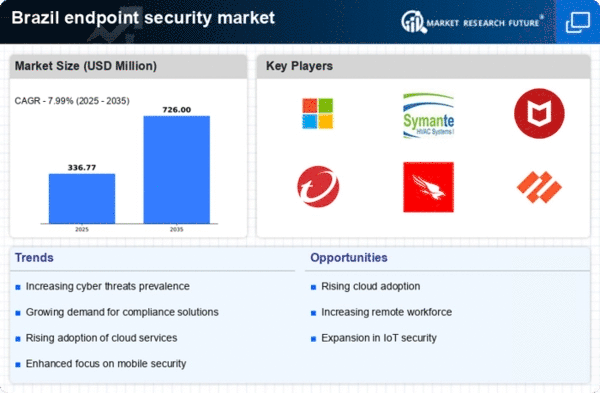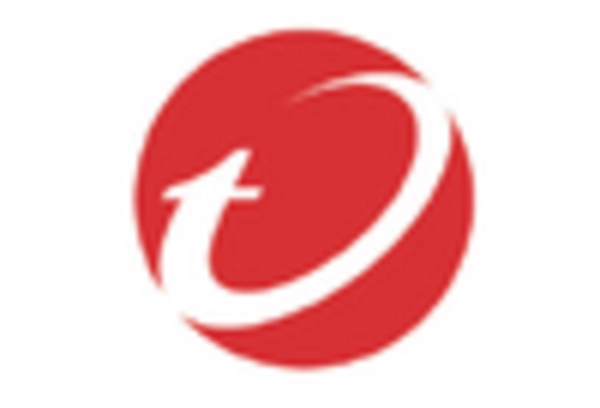Adoption of Cloud-Based Solutions
The shift towards cloud computing is significantly influencing the endpoint security market in Brazil. As organizations increasingly migrate their operations to the cloud, the need for comprehensive security solutions that protect endpoints becomes critical. In 2025, the cloud services market in Brazil is projected to grow by 25%, necessitating enhanced security measures to safeguard sensitive data. Endpoint security solutions that integrate seamlessly with cloud environments are becoming essential for businesses to maintain compliance and protect against data breaches. Furthermore, the rise of remote work has amplified the demand for cloud-based endpoint security solutions, as employees access corporate resources from various locations. This trend indicates a robust growth trajectory for the endpoint security market in Brazil.
Increasing Cyber Threat Landscape
The endpoint security market in Brazil is experiencing heightened demand due to an escalating cyber threat landscape. Cybercriminals are increasingly targeting organizations, leading to a surge in malware, ransomware, and phishing attacks. In 2025, it is estimated that cybercrime costs could reach $10 trillion globally, with Brazil being a significant contributor to this figure. As businesses recognize the potential financial and reputational damage from breaches, investment in endpoint security solutions becomes imperative. The need for robust protection mechanisms is underscored by the fact that 60% of small and medium enterprises in Brazil have reported experiencing cyber incidents. This alarming trend drives organizations to prioritize endpoint security, thereby propelling market growth.
Integration of Advanced Technologies
The integration of advanced technologies such as artificial intelligence (AI) and machine learning (ML) is transforming the endpoint security market in Brazil. These technologies enable organizations to detect and respond to threats more effectively, thereby enhancing overall security. In 2025, it is anticipated that AI-driven security solutions will account for a significant portion of the endpoint security market, as they offer real-time threat intelligence and automated responses. The ability to analyze vast amounts of data quickly allows businesses to identify vulnerabilities and mitigate risks proactively. As Brazilian organizations seek to stay ahead of cyber threats, the adoption of these advanced technologies is likely to drive innovation and growth within the endpoint security market.
Growing Awareness of Cybersecurity Risks
There is a notable increase in awareness regarding cybersecurity risks among Brazilian organizations, which is positively impacting the endpoint security market. As businesses become more cognizant of the potential threats posed by cyberattacks, they are more likely to allocate resources towards enhancing their security posture. Surveys indicate that 70% of Brazilian companies consider cybersecurity a top priority for their IT strategy in 2025. This growing awareness is driving demand for endpoint security solutions that offer comprehensive protection against evolving threats. Additionally, educational initiatives and industry collaborations are fostering a culture of cybersecurity, further propelling the market forward. The endpoint security market is thus benefiting from this heightened focus on risk management and proactive security measures.
Regulatory Compliance and Data Protection Laws
the endpoint security market in Brazil is strongly affected by the increasing emphasis on regulatory compliance and data protection laws.. The implementation of the General Data Protection Law (LGPD) mandates that organizations adopt stringent measures to protect personal data. Non-compliance can result in fines of up to 2% of a company's revenue, which can be substantial for many businesses. As organizations strive to meet these legal requirements, they are compelled to invest in advanced endpoint security solutions. This regulatory landscape not only drives market growth but also encourages the development of innovative security technologies tailored to comply with local laws. Consequently, the endpoint security market is poised for expansion as businesses prioritize compliance and data protection.
















